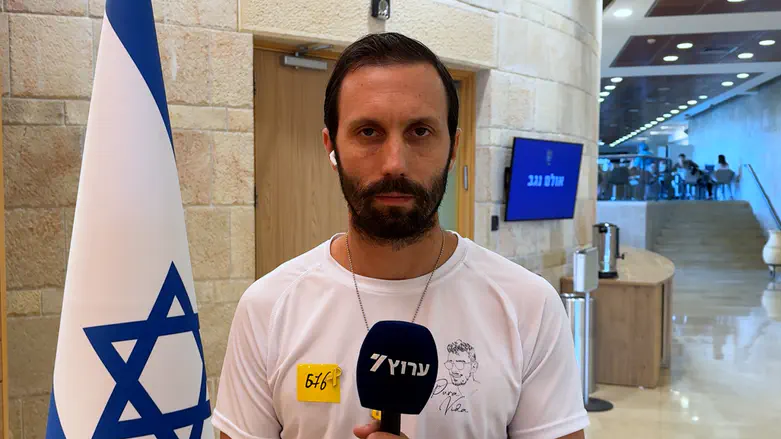Arutz Sheva spoke with Daniel Lifshitz, grandson of Yocheved Lifshitz – who was released from Hamas captivity – and Oded Lifshitz, of blessed memory, who was murdered in captivity and returned to Israel, Lifshitz spoke from the Knesset, where he and his grandmother joined activities calling for the release of all hostages held in Gaza.
Talking about his grandmother, Lifshitz said, “Physically, my grandmother has recovered, but mentally, she says she will still be in the tunnels until the last hostage comes back home. While in captivity, she met Matan Zangauker, and she brought us the information that he had been kidnapped and was alive.”
“I just spoke with her about David and Ariel Cunio,” he continued. “Two weeks before October 7th, they met for the last time, and she gave them some cherry tomatoes. For her, they are like family. She remembers how David used to visit her with his twin brother Eitan. She keeps going – she will turn 87 on September 1st – and it’s devastating that my grandfather’s captivity ended the way it did. For her, there are still nine family members – because Kibbutz Nir Oz is one big family – who remain in Gaza.”
Lifshitz says sadly, “My grandfather was badly injured on October 7th in Kibbutz Nir Oz, dragged outside, and left on the ground unconscious and bleeding. The terrorists thought they had murdered him – even my grandmother believed it at first. Only after the first hostage deal in November did we learn that he was taken alive to Gaza. There he met Ada Sagi, who told us he was deeply worried about my grandmother, and that is probably what kept him alive for 20 days. Later he was held in an apartment with Hana Katzir, without medication. After 20 days he fainted and died, likely due to lack of food and untreated injuries, including broken ribs, as we learned from the autopsy.”
“We had no clear information about him until day 502 because of the lack of intelligence. His return, in what I consider the worst convoy in history, marked a black stain on the international community for failing to save babies and grandfathers. Kfir Bibas, the only baby held hostage in the world, was held with my grandfather,” Lifshitz described, adding that “when my grandfather’s body came back, the amount of tears from Gaza to Abu Kabir could have filled the Sea of Galilee. Our mission is to leave no one behind – alive or deceased – so families can have closure. Every family of a hostage is also a hostage until their loved one returns home.”
Regarding the current hostage deal discussions, Lifshitz demands that, “the international media act more responsibly. We see how their coverage influences Hamas, such as with the so-called starvation campaigns. I’m not denying that there is hardship in Gaza, but if the situation is so dire, why run fake campaigns with a child who has cystic fibrosis?”
“Regarding the recognition of a Palestinian state – there is a long path before that could even be considered. The Arab League should first demand the immediate, unconditional release of all hostages, a permanent ceasefire, humanitarian aid into Gaza, and Hamas’ disarmament. Hamas must not be part of Gaza’s governing body. The international community must ensure there is no reconstruction while Hamas remains armed,” he stated adamantly.
“The IDF has achieved significant victories since the failure of October 7th. Now the negotiations must bring everyone home, with real pressure applied to make sure Hamas is not part of Gaza’s future.”
Hamas says they will not release hostages until Gaza’s reconstruction begins, to which Lifshitz responds, “first, release all the hostages. The right pressure should be applied, from President Trump, from the US, from the entire international community, on Qatar, Turkey, and Egypt to bring Hamas back to the negotiation table.”
“Last time, Israel and the US may have folded too early. Now we must aim for a full-scale deal, even if it takes 60 days like the Witkoff plan. During that time, Israel must ensure its defense and return to our true DNA – a DNA of peace. As we secure ourselves, we know how to make painful concessions for peace,” he concluded.

